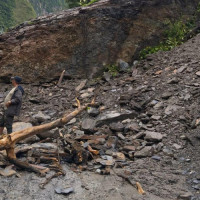- Friday, 22 August 2025
Humanity Beyond Geopolitical Games
Humanity finds itself at a pivotal point in a period marked by swift transformations and the looming threat of conflict. While technological and economic ambitions reach new heights, the essence of human dignity is sinking beneath rising waves of militarisation, propaganda, and rivalry. The military–industrial nexus between major powers stretches beyond markets and trade agreements, saturating media ecosystems, spreading division, and reframing alliances. Truth has become negotiable, while citizens across continents are trapped in a fog of misinformation. Behind the headlines, the global arms trade flourishes quietly—profiting from instability, even as ordinary lives are torn apart.
There is a cruel irony in our modern geopolitical order: in many developed nations, household pets receive more rights and care than children in war-torn regions. This is not to diminish animal welfare but to expose our misplaced priorities. Vulnerable communities are increasingly seen as expendable, their suffering reduced to statistics instead of memories. In a world where weapons are valued more than wisdom, deterrence is prized over dialogue, and peacekeeping is compromised, we risk sacrificing the very humanity we claim to defend.
A quarter century ago, both Sierra Leone and Nepal were affected by internal conflicts. The tragedies differed in form but not in pain. In Sierra Leone, diamonds—symbols of luxury abroad—fuelled massacres at home. Children were turned into soldiers, neighbours into enemies, and profit was placed above morality. In Nepal, a decade-long conflict showed how violence serves power, not people. Citizens longed for dignity and bread, while politicians fought over chairs of authority. Even today, the revolving door of Nepali leadership spins endlessly, with some even invoking monarchy—not out of loyalty to the nation, but to protect personal interests.
Socrates described war as the product of ignorance and injustice. Once deemed a last resort, war today is normalised and, at times, glamorised. From Nepal to Sierra Leone, Gaza to Ukraine, and Israel to Kashmir, countless regions have become graveyards of human hope—where blood flows not for justice, but for the egos of leaders drafting policies for their power and prosperity. Were Plato, Aristotle, or Descartes alive today, they might be less astonished by modern complexity than by humanity’s moral collapse in a world that dares to call itself “civilised”.
Under the illusion of nuclear threats, powerful nations mould weapons of mass destruction not to defend life, but to dominate it. In this pursuit, humans are commodified—treated as assets, not souls. Thus, humanity becomes both the currency and the casualty of geopolitical games.
This is not limited to fragile nations like Nepal or Sierra Leone. Middle-income states such as India and Pakistan, or strategically influential ones like Iran, Israel, Russia, and Ukraine, are equally caught in the same power matrix. Global giants pull the strings behind the scenes—fuelling conflicts, shaping diplomacy, and manipulating outcomes for strategic gain.
The tools of violence may have evolved—from handmade weapons to nuclear arsenals—but the intent remains unchanged: to dominate, harm, and kill fellow human beings. Amid this, calls for peace often ring hollow, drafted more for political convenience than genuine conviction. What is painfully absent is brotherhood.
J. Krishnamurti reminded us, “When there is love in your heart, you do not talk about organising for brotherhood.” True unity cannot be built on ideologies or alliances alone. It must arise from an awakened realisation—where love replaces suspicion, reconciliation replaces retaliation, and the human heart speaks louder than war machinery.
For centuries, defence policies have echoed the maxim of Publius Flavius Vegetius Renatus: “Si vis pacem, para bellum”—“If you want peace, prepare for war.” Yet, this belief no longer holds in today’s interconnected, fragile, media-driven world. Preparing for war does not secure peace; it magnifies fear, fuels arms races, and deepens hatred. We must replace it with a new truth: “If you want peace, prepare your people—with justice, dialogue, and hope.”
Peace is not born in arsenals; it is nurtured in communities. It begins with trust and truth, grows in classrooms, and flourishes where justice outweighs revenge. Peace is not the absence of war—it is the presence of fairness, inclusion, and dignity. And it cannot be engineered through fear or economic manipulation; it must be built from the grassroots, through empowered citizens and accountable institutions.
I have served in places where peace was only a memory, and war was the daily reality. I have seen lives lost to egos and humanity buried beneath minerals and misinformation. These experiences taught me that peace is not passive. It requires courage—greater than that needed to wage war. The courage to listen, disarm egos, confront inequalities, and build systems prioritising life over land and dignity over dominance.
Ultimately, the Earth does not belong to power blocs or ideologies but to its people—farmers, teachers, children, youth, and elders. For them to inherit a liveable future, global leadership must shift from conquest to compassion and rivalry to resonance. Let our generation be remembered not for what we destroyed in the name of security, but for what we protected in the name of peace.
Nature may take life, but it does so without hatred or intent. The tragedy of humanity is that, despite our consciousness and intelligence, we kill by choice—driven by greed, fear, or ego. What does it say about us if we cannot end this destructive cycle after millennia of progress? When love is in your heart, you do not build bombs to protect nations—you build bridges to protect life.
So, who will bring peace to a world consumed by capitalism and power games? Not those at the top—they are too invested in the status quo. It must be Earth’s citizens: the farmers, mothers, youth, students, and reformers who have suffered enough and seen enough. Those who know that true power lies in compassion, not conquest.
Let peace be more than a pause in gunfire. Let it be the rebirth of truth and dignity—anchored in justice, dialogue, and hope. Let history remember that when the world trembled on the edge, we chose not to sharpen our swords but to soften our hearts.
(PhD Scholar Thapa is a retired brigadier general and a peacebuilding and security sector reform specialist.)



-(1)-original-thumb.jpg)












